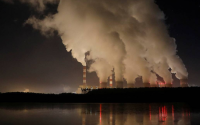14 February 2007Alternet / Christian Science MonitorGregory Lamb
Just a few decades from now, people may look back at the early 21st century with both fondness and horror as the Era of the Cheap Airline Flight. They may wax nostalgic for the days when visiting distant relatives and taking vacations in exotic locales were easily affordable for the masses. But they also may be alarmed at how long it took the world to realize the havoc that unfettered air travel was wreaking on the world's climate.
At least one travel industry official predicts that in 30 years, long-distance flying will be undertaken only by the wealthy as ticket prices rise dramatically -- and the number of flights shrinks proportionately -- to curb the emissions of greenhouse gases created by air travel.
Jet engines burn kerosene, which gives off carbon dioxide (CO2), a leading cause of global warming. Airline flights today make up less than 3 percent of man-made CO2 emissions, though they also spew nitrogen oxide, sulfur dioxide, soot, and water vapor that may double their total warming effect on the climate.
Now two factors are conspiring to make airline travel a hot topic in the global-warming debate: If current trends continue, the number of airline tickets sold per year will double to more than 9 billion by 2025, according to a new study by the Airports Council International. At the same time, experts see no viable jet-fuel alternative to kerosene. While some modest fuel-conservation measures still can be taken, more and more people are concluding that fewer flights may be the only way to cut airline emissions significantly.
In Britain, a prosperous island country that makes heavy use of air travel, CO2 emissions from flights will surpass those from automobile trips in the next six to eight years, says Alice Bows, a senior research fellow at the Tyndall Centre for Climate Change Research at the University of Manchester.
Four years ago, the British government pledged to cut greenhouse-gas emissions by 60 percent by midcentury. As the difficulty in achieving that goal has become more evident, air travel has become the whipping boy for environmentalists. Prime Minister Tony Blair was criticized for flying to Miami for a Christmas holiday, and Prince Charles was viewed as a hypocrite for boarding a jet to Philadelphia to accept an environmental award. Last summer, the Bishop of London, Richard Chartres, called taking a vacation by airline "a symptom of sin" in which "people ignore the consequences of their actions." The bishop vowed he would not board an airplane in 2007.
Asking the British people to cut down on air travel is impractical, Mr. Blair says. But the government has just upped a tax on airline flights from £10 to £40 ($19 to $76), depending on the length of the flight, in the name of reducing air travel and CO2 emissions.
For years, airline companies have worked to increase fuel efficiency (and coincidentally reduce CO2 emissions) to counter the skyrocketing price of kerosene. New aircraft, such as Boeing's 787 Dreamliner due out in the summer of 2008, will be made of lighter composite materials and employ other fuel-saving measures. But these improvements won't be nearly enough to offset the predicted increase in demand for air travel (including air freight).
Other fuel-saving suggestions include pulling planes from the gate to the runway with their engines only idling, reducing the fuel used to taxi into position for takeoff.
Modernized air-traffic control systems could reduce the number of planes circling airports waiting to land or take off, says John Meenan, executive vice president of the Air Transport Association of America, which represents the nation's airlines. Commercial airliners today follow ground beacons to their destinations that result in indirect and inefficient zigzag routes, Mr. Meenan says. A new air traffic management system could yield a 12 to 15 percent improvement in environmental performance.
"It's a matter of making the investment to make that happen," he says.
In the long term, biofuels, possibly ethanol made from switch grass or biowaste, could provide an alternative. But no one knows when that could happen. "One of the realities we're dealing with in aviation is that there are no alternatives" to CO2-emitting kerosene fuels, Meenan says.
The European Union has proposed incorporating aviation into its carbon-emissions trading plan by 2011, a so-called "cap and trade" scheme. That would allow airlines to "buy" the right to emit carbon from other industries, such as power generation, which could sell carbon credits if they reduced their emissions below their cap.
People aren't going to give up airline travel easily. For long-distance travel, there's really no practical replacement. "We think the free movement of people and goods is a pretty fundamental right," says Graham Lancaster, a spokesman for Britain's Federation of Tour Operators.
The effect of a drastic reduction of airline flights on the world economy would be significant. Aviation drives about 9 percent of world GDP, Meenan says.
"The countries that would be hit hardest would be developing countries, because they're more dependent on tourism," says Justin Francis, CEO of responsibletravel.com, an online travel agency specializing in ecotourism based in Brighton, England. In half of the developing countries, tourism is one of the top three industries, he says.
"My view is that we must fly less," Mr. Francis says, adding that the ecoconscious might decide to take only one big vacation flight each year and take shorter nonflying vacations the rest of the year. Hopping around Europe every few weeks on the low-cost airlines that have sprung up in recent years would have to end, he says.
"The world is coming to realize the biggest threat we face is carbon emissions," Francis says. "Governments are under pressure to take action. One of the places they will look is the airline industry because it is such a rapidly growing source of emissions."






